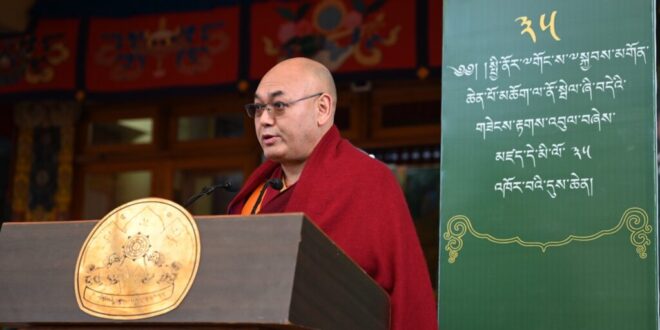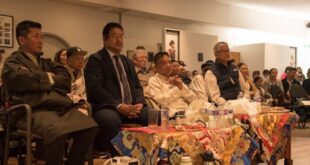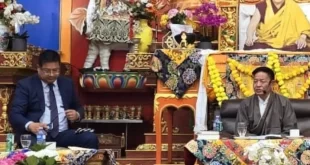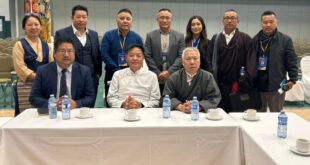Dharamshala: We are gathered here today to observe a momentous occasion marking the 35th anniversary of the conferment of the world’s most outstanding award for peace, the Nobel Peace Prize, on His Holiness the Great 14th Dalai Lama. His Holiness is the refuge and protector as well as the irreplaceable leader of the entirety of the Tibetan people in Tibet as well as those living in exile. He is also a champion of world peace, the spiritual lord of the three realms of existence, a master of the entire corpus of the teachings of the Buddha, and the apex ornamental pride of the material and spirit worlds including the heavenly realms. His Holiness the Dalai Lama’s affection towards all sentient beings across the expanse of the universal space is like that of a mother towards her only child. It is on this basis that he has over times beyond any limit continued to carry out inconceivable ranges of fulfilment of desires through his body, speech and mind deeds. For the fact that he continues to be in this state of steadfast commitment to this day, we, on behalf of the Tibetan people in Tibet and in exile, offer greetings and extend wishes of auspiciousness to His Holiness with profound body, speech and mind reverence and out of a great sense of gratitude.
The world’s outstandingly renowned Nobel awards were instituted in the year 1901 and they included the Nobel Prize in Physics, the Nobel Prize in Chemistry, the Nobel Prize in Physiology or Medicine, the Nobel Prize in Literature, and the Nobel Prize for Peace. The Nobel Prize in Economic Sciences was instituted later on in 1969. All the other awards were instituted after the death of the eminent scientist Alfred Nobel in 1896, based on his bequest of the bulk of his fortune to establish such awards. His aim was to give recognition to people who “conferred the greatest benefit to humankind” through their innovative contributions in these fields of knowledge.
The Nobel Peace Prize for 2024 has been awarded to a Japanese group called Nihon Hidankyo (The Japan Confederation of A- and H-Bomb Sufferers Organisations), which was formed in 1956 by survivors to lobby, among other things, the Japanese government for improved support for the victims of the 1945 atomic bombings of Hiroshima and Nagasaki, and to be able to act in concert with those in the international community who work to prevent nuclear armed conflicts and to eliminate nuclear weapons. We wish to extend our compliments and congratulations to the concerned responsible people in this organisation.
As highly renowned as it is, the aim of the Nobel Peace Prize is to honour those who work to establish an international order marked by improvement in friendship among nations, the reduction and eventual elimination of weapons of warfare, the prevention of armed conflicts, the securing and promotion of peace, fairness and equality. This is in keeping with the unsurpassed general conceptual framework of His Holiness the Dalai Lama who has been engaged in the promotion of peace and love for all sentient beings. And this has been especially true in the case of his focus towards the struggle for the restoration of the freedom of the Tibetan people, for which he has provided leadership based solely on peaceful means. This was duly recognised by the Nobel Peace Committee, which on the 10th of December 1989 presented to him the Nobel Peace Prize. Thanks to this award, the global publicity for the just struggle of the Tibetan people and support for their just cause received unprecedented fillip. And so we take the opportunity provided by this momentous occasion to express profound, heartfelt gratitude to His Holiness the Dalai Lama for all his past and still continuing noble deeds for the sake of the Tibetan people. At the same time, we wish to appeal to the entirety of the Tibetan people to remember the imperative to continue our commitment to adhere solely to non-violent means as the defining character of our struggle and to act with unity and consolidation of efforts, as advised by His Holiness the Dalai Lama, for the purpose of the realisation of the fundamental cause of Tibet.
For the sake of the Dharma and all sentient beings, and especially in the long-term interests of the Tibetan people, His Holiness the Dalai Lama has, since coming into exile in India, provided advices as well as entertained wishes that are most beneficial to us, undaunted by a multiplicity of difficulties that came along his way. These have seen him establish the Tibetan government in exile, as well as schools, religious centres, and settlements for the Tibetan people. He has instituted non-violent means for the Tibetan struggle for achieving the just cause of Tibet. He has founded a Tibetan community in exile based on principles of fairness and equality. It was on these bases that His Holiness guided the Tibetan people on the path of democracy. As a result, the Tibetan community stands out as distinct among all the refugee groups across the world today, marked by continued development with success and progress. These can be seen as evident to anyone. The gratitude we owe to His Holiness the Dalai Lama for all this is an internationally acknowledged fact. And this is the milieu in which His Holiness has tasked himself to make efforts to see the realisation of a compassionate world by setting for himself a mission to carry out four principal commitments and to promote the principle of secular ethics. The latter has been incorporated into modern education systems. He has directed these efforts at realising the resolution of disputes in this world by non-violent means through negotiations so that global affairs will proceed in a peaceful manner, marked by an end to the use of arms. This is an extremely important wish of His Holiness the Dalai Lama. It has, in fact, become an extremely important need for this world today too and its leaders should pay attention and make efforts to fulfil such enormously important desires as this one of His Holiness which is mutually beneficial to everyone.
Today is also the international Human Rights Day. It marks the completion of 76 years since the United Nations General Assembly adopted and proclaimed in 1948 the Universal Declaration of Human Rights. However, what is tragically saddening as we commemorate this day is that Tibet still remains a victim of armed invasion and occupation by communist China. The result of this was that in 1959, His Holiness the Dalai Lama and many other Tibetan people were forced to flee their country to seek refuge in India – a situation which continues to this day. Since that year, the human rights situation of the Tibetan people in Tibet has kept worsening year after year, with nothing to cite as an improvement in this downward trend. On the contrary, the government of China has implemented in Tibet a succession of highly brutal policies of repression directed at obliterating the Tibetan national, linguistic, and religious identity and destroying the country’s natural environment. These have given rise to outbursts of Tibetan protests which included the spontaneous uprising of 10 March 1959. A succession of peaceful protests by Tibetans also took place in the 1980s and 1990s. And in 2008, Tibetans across the occupied country’s three historical provinces took part in spontaneous mass uprising protests against the Chinese government. Besides, from the year 2009, till date, a total of 157 Tibetans are fully known and verified to have carried out peaceful self-immolation protests against the government of China. They all raised demands that His Holiness the Dalai Lama be invited back to Tibet, that there be freedom and independence for the country, and so forth. Nevertheless, the government of China has thus far not at all responded in a way which addressed the ground reality of the tragic situation in Tibet. Rather, it has completely ignored the human rights of the Tibetan people and, instead, detained, interrogated, beaten, imprisoned, restricted the free movement of the victims and other Tibetan people, while making false allegations.
In January this year, the report of the United Nations Human Rights Council’s Universal Periodic Review (UPR) Working Group on China’s human rights record was discussed in the Swiss city of Geneva. The working group highlighted around 18 instances of human rights violations in Tibet, among others. This report shows that compared to the working group’s previous UPR reports in 2009, 2013 and 2018, the human rights situation in Tibet has seen marked deterioration on a number of issues. And it also indicates heightened attention to it on the international stage. The human rights record of the government of China has been examined under the Universal Periodic Review system on successive occasions. And China has been subjected to rigorous questioning on its violations of human rights in Tibet highlighted in these working group reports.
Likewise, at the 57th session of the United Nations Human Rights Council held in September this year in the Swiss city of Geneva, the delegate representing the European Union reiterated concern over the downward spiralling in the human rights situation in Tibet. The representative’s statement highlighted the repression, harassment, intimidation and surveillance faced by human rights defenders, lawyers, journalists, media workers, writers and intellectuals, including at transnational level. Also, a joint statement issued by a meeting in Italy of the foreign ministers of the Group of Seven (G7), a grouping of seven of the world’s most advanced economies, in November this year expressed concern and highlighted the lack of human rights in Tibet and other regions.
For such throwing of spotlight on the real situation in Tibet, we wish to express our heartfelt gratitude to the international community. We also wish to reiterate our call on the government of China to mend its ways on these issues and give the Tibetan people their freedom and human rights.
In order to raise awareness about the issue of Tibet across the world, with a view to win support for it, the Tibetan Parliament-in-Exile has an ongoing programme for delegations of groups of its members carrying out lobbying activities. Visits for such purposes have been undertaken in Europe with delegations of the Parliament in exile members travelling to Belgium, Switzerland, France, Germany, the Czech Republic, Luxembourg, as well as the Baltic states of Lithuania, Latvia, and Estonia. These have seen the delegates from the Tibetan Parliament-in-Exile holding meetings with the Speakers and Deputy Speakers of parliaments, parliamentary foreign affairs committee members, members of the upper and lower chambers of parliaments, foreign envoys, Tibet Support Group members, also other prominent public figures, representatives of non-governmental organizations, and numerous others. At these meetings, the delegation members spoke about the political situation in Tibet, the gravity of the current situation there, including, in particular, about the political prisoners and human rights, and made appeals for support on these issues. Apart from that, discussions have also focused on ways to consolidate efforts in carrying forward the struggle of the Tibetan people. Likewise, in November this year, the Speaker of the Tibetan Parliament-in-Exile led a delegation of members to England and Scotland with the agenda to cultivate success in political ties and in connection with the working of the parliament system. During the visit to England, meetings were held with a number of eminent personality, such as the Lord Speaker and the Speaker of the Commons, as well as members of the parliament’s foreign affairs committee. They were apprised about the issue of Tibet and the visits were a great success. We take the opportunity provided by this occasion to express our thanks to everyone who made possible our meetings with the eminent people in these countries and who facilitated our works there.
Apart from that, we also wish to express our thanks to the governments, parliaments, peoples, as well as non-governmental organisations, including, in particular, the government and people of our host country India, the United States of America, and Europe and others in the international community for their strong support for the issue of Tibet, and in the fields of religion, culture, and language.
In conclusion, we offer prayers for the fulfilment of our ardent wish that His Holiness the Dalai Lama, the victorious one, may live for a hundred aeons, that all his great desires may be seen accomplished spontaneously, that peace may be seen enhanced across the world, and the Tibetan people in Tibet and exile may be seen reunited on the basis of a speedy resolution of the Sino-Tibetan conflict.
By The Tibetan Parliament-in-Exile
10 December 2024
* In case of any discrepancy between this English translation and its Tibetan original, the latter should be considered as authoritative and final for all purposes.




